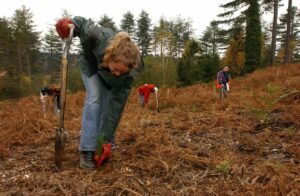Summary
Increasing woodland cover is a priority for all three nations of Great Britain. There are ambitious woodland creation and tree planting targets in each. This provides opportunity to restore degraded landscapes while tackling the climate and biodiversity crises.
This core Programme of research includes a number of projects which aim to understand more about new woodlands: where to locate them, how they develop, what benefits they might provide over time, and how this can be achieved. The research in this Programme aims to untangle the complex interactions between location, extent and species, and discover which combinations can reliably confer multiple benefits such as carbon capture and improved biodiversity. The research will co-produce products and tools which support land managers, stakeholders and policymakers to increase engagement with woodland creation activities.
Research Objectives
- To learn more about who might create new woodlands, what their reasons might be, and what support they need.
- To develop methods for identifying the locations of existing trees outside woodlands from remote sensing data to inform assessments of woodland creation.
- To find out what ecological and social benefits new woodlands (created through both ‘planting’ and ‘natural colonisation’) provide and when they are provided.
- To use an agent-based model and woodland expansion scenarios to explore where and how new woodlands should be created to maximise. ecological and social benefits

Latest Update
We have published an updated dashboard which allows users to explore our systematic mapping of the social science evidence relating to land managers and woodland creation.
